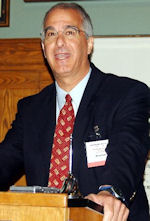by James A. Bacon
Sidney Gunst has never been reluctant to express his ardent views on the failings of government and has never been shy about chastising public officials, even to their face. But the former real estate developer has never felt as determined as he is today to challenge the status quo.
The latest event to inspire him to action was a bid by Henrico County officials to sneak through the General Assembly a bill that would allow it to levy a new tax on food and beverages without a citizens referendum. What particularly galled Gunst is that the wording of SB 1311 never mentioned Henrico County by name, instead referring obliquely to “any county that has withdrawn from the secondary state highway system pursuant to § 33.1-23.5:1 and is adjacent to a city that also operates its own road system.” Henrico is the only jurisdiction in Virginia meeting that description.
Having tried but failed in 2005 to persuade voters in a referendum to add a 4% meals tax, Gunst says, county officials tried to slip the tax through the state legislature. “They bypassed the citizens. … They don’t want to face the voters.” (Full disclosure: Sidney is a personal friend.)
With Gunst adding populist appeal — printing posters, creating a website, rallying Henrico residents to his cause and stalking the halls of the General Assembly — the retail and hospitality industries managed to stall the bill in a House committee. Confounded in the legislature, Henrico officials now are taking their case to the people.
Due to the recession, Henrico County is operating on less revenue than it generated six years ago. The county has eliminated or “unfunded” 377 vacant positions in the past three years, reduced debt and interest payments, cut travel and tuition costs from departmental budgets, and found other budgetary savings. “There simply are no more options outside significant service reductions, elimination of existing staff, and/or consideration of a tax increase or other revenue enhancement,” warned then-county manager Virgil Hazelett last July.
Since then, accounting rules are forcing Virginia counties to acknowledge massive unfunded pension liabilities, the Environmental Protection Agency is imposing expensive storm-water management mandates, and rising health care costs, which some attribute to the Affordable Care Act, are running up payroll costs. Rather than increase the property tax, county officials contend that hiking the meals tax causes less pain because 40% of the revenue comes from non-county residents.
Gunst understands that the county officials are between a rock and a hard place but he has no intention of backing off. He denounces the meals tax as a regressive tax on “harried” families who eat out frequently while juggling work, children and other activities. The federal government just increased the payroll tax 2%, state government just raised the sales tax and now county government wants to create a meals tax — all while unemployment remains high and wages are stagnant, says Gunst. “Is it really a good time to ask people to pay even more taxes, Mr. Supervisor, while wealth is going down?”
But Gunst’s critique runs deeper. A devotee of Ayn Rand’s philosophy of objectivism, he wants to spark a re-thinking of local-government fundamentals. As he told me: “I want Henrico County to be a model for restructuring, redeploying, innovating and reinvigorating how government services are provided to its citizens on a drastically lower cost structure.”
Best known for developing the Innsbrook corporate real estate park, Gunst concedes that Henrico County is one of the best-run counties in the United States. The county has a AAA bond rating, a low property tax rate ($0.87 on the dollar) and is widely recognized for its lean government. But that’s just not good enough, says Gunst. The current cost and revenue structure “is not self sustaining.”
“We want to make them drastically better — the best! Like when you go from a prop plane to a jet plane. It’s a reflection of the times we live in. We can’t sustain a broken model. We have to restructure.”
The $18.5 million anticipated revenue from the meals tax revenue won’t come close to addressing the county’s long-term financial problems, he contends. Perhaps the county needs to trim salaries, which are the highest in the region, and perhaps it should shift employees to a full 401(k) retirement plan, as many in the private sector are doing, to address its half-billion in pension liabilities. The county holds 585 parcels of land, some of which are not utilized — why not sell some? The county has sunk millions into new libraries — why not shift to digital libraries?
The county could do more on the revenue side, too, he says. “How about making Henrico a magnet for New Urbanism?” The county bureaucracy hampers development and re-development of projects with more density and walkable, mixed-use designs. Gunst is intimately familiar with the costs of sprawl — he was a chief architect of it when he built Innsbrook three decades ago. But he has come to see the error of his ways. Spurring the right kind of re-development in the right places, he says, will generate significant new revenues without incurring large new capital and maintenance obligations.
The battle is far from over. The county is holding a series of public hearings on the proposed meals tax, and Gunst worries that low turn-out in an off-year election might favor the tax increase. But he intends to fight every step of the way. If citizens reject the idea, he says, maybe, just maybe, Henrico’s leadership will start thinking more boldly and creatively about what local government does and how to pay for it.



